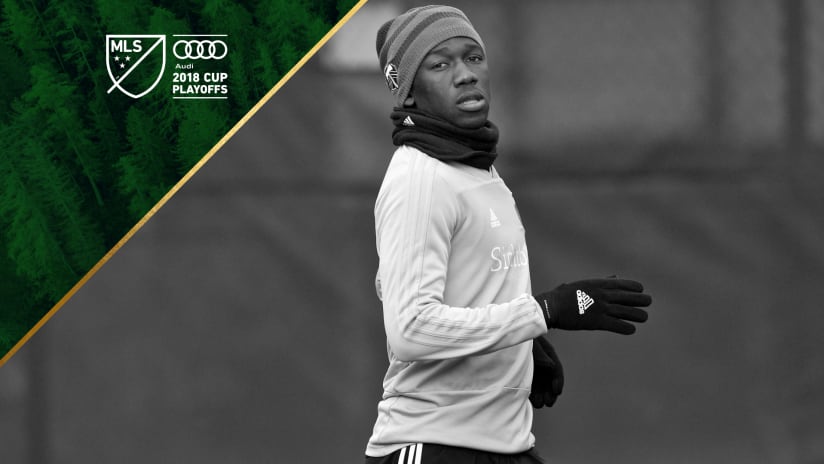BEAVERTON, Ore. – What once was a lingering question about the 2018 Portland Timbers has, over the course of a month, become a strength. At least, to hear Portland players talk about it after Sunday’s 0-0 draw with Sporting Kansas City in the first leg of the Audi 2018 MLS Cup Playoffs Western Conference Championship, the idea of playing on short rest no longer feels like a challenge unfulfilled. What was a burden in the regular season has become a cause for pride in the playoffs.
“We went and won in Dallas,” central defender Liam Ridgewell explained, after the team’s draw with Sporting, “and we went and won in Seattle … We just keep rolling and playing as a team, and we can win anywhere.”
The team’s 2-1 victory at FC Dallas in the Knockout Round to start the postseason came two days after they closed the regular season in Vancouver. The Timbers’ semifinal-clinching performance in Seattle? There were only three days between that and the teams’ first leg in Portland. After going 2-3-2 during the regular season on four or fewer days’ rest (with both wins coming at home), the Timbers are technically 1-1-0 this postseason, though that loss was a series-clinching, extra-time, penalty kick shootout effort in the semifinals against the rival Sounders.
“We have done well (recently on the road),” Timbers head coach Giovanni Savarese said, “and I think the best part about it is that we’ve been playing very together, very united.”
Perhaps that hints at what’s changed from the regular season. When, midseason, MLS’ schedule started handing the Timbers quick turnarounds, a squad that had undergone significant changes during the offseason may have still been coming together, as a team. Players had endured injuries, World Cup absences, and in some cases were still growing into their new places in the team, a process made more complex by a largely new coaching staff coming to Portland in the offseason.
If Savarese’s implied theory is correct, the more familiar a team is with each other – the more “together” they are, in how they approach their play – the more likely they are to meet their schedule’s challenges. Perhaps cohesion helps tackle other obstacles, too, but in terms of Portland’s performances on short rest, the team’s results improved as time provided more space to gel.
“[Playing together] is very important when we play away from home,” Savarese explained. “We know it’s going to be a challenge in Kansas City, but the guys are feeling pretty good that whoever is going to step on the field is going to do the job.”
There is another theory, though, that could explain the Timbers’ uptick in performance, one that may exist independent of the time the group has had together, the tactical changes that evolved during the season, or the possibility the team is simply regressing to a short-rest-performance mean they’d failed to meet throughout the season.
“I think the change is the playoffs,” midfielder Diego Chara theorized. “We know this is a great opportunity to be champions, again.”
For a team with a veteran core, one that has navigated MLS’ postseason waters before, Chara’s explanation also makes sense. It may explain why Ridgewell, another veteran, is so confident in the team’s chances, but as with anything related to the postseason, it is difficult to disentangle performance, in isolation, from the groundwork that came before. Are Timbers players merely stepping up when it matters most, or is the foundation for those steps made up of lessons from the regular season?
Ultimately, the difference doesn’t matter. At least, it doesn’t matter right now. Sure, you would like to know the true cause of anything, just so you will know how to solve problems, going forward. But ahead of Thursday’s second leg of the Western Conference Championship (6:30pm PT, ESPN | Presented by Oregon Lottery), the only thing that matters are the results – as well as Portland’s belief they have moved past their issues with short turnarounds.












